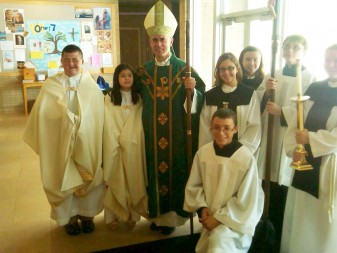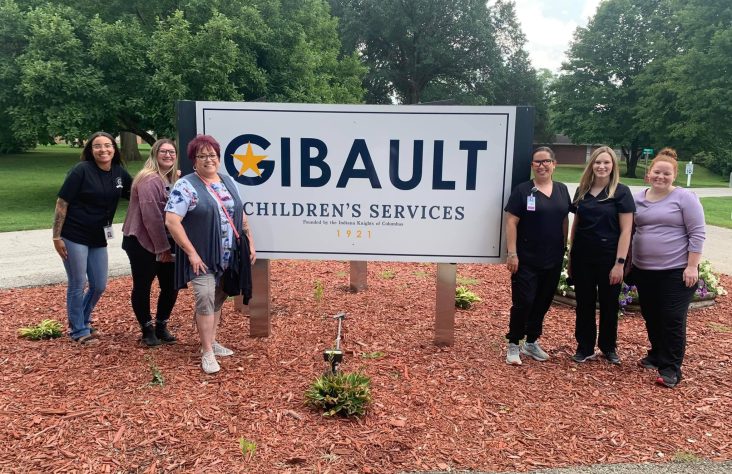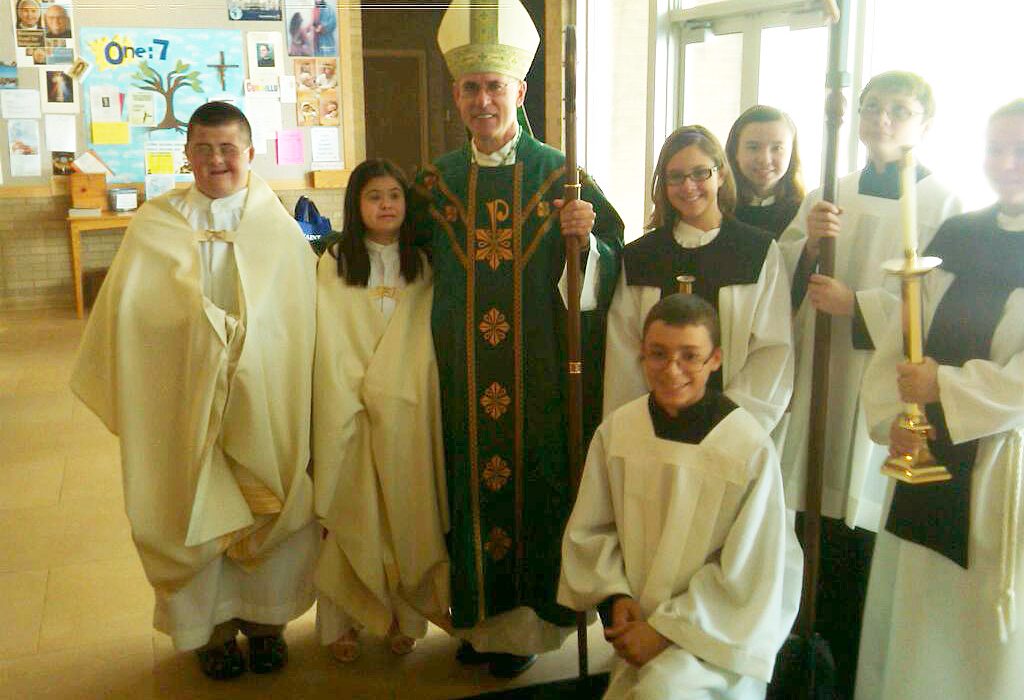October 3, 2012 // Local
Special Mass speaks to value of people with disabilities

Bishop Kevin C. Rhoades gathers with Mass servers after the Mass for those with disabilities on Sunday, Sept. 23, at St. Matthew Cathedral in South Bend. The diocese provided bus transportation for those who wished to attend from the Fort Wayne area.
SOUTH BEND — Bishop Kevin C. Rhoades celebrated a Mass for those with disabilities, their families and caregivers on Sunday, Sept. 23, at St. Matthew Cathedral in South Bend. The purpose of the Mass was to celebrate the lives and the gifts of people with disabilities, and was sponsored by the Diocese of Fort Wayne-South Bend Office of Evangelization and Special Ministries. A reception followed the Mass.
Throughout the celebration, Bishop Rhoades spoke of the immense value that people with disabilities bring to their parishes and to the diocese. Assisting at the special Mass were altar servers, proclaimers of the word, gift bearers, extraordinary ministers of the Eucharist, choir members and a sign language interpreter — many of whom had visible disabilities.
“The Catholic Church professes the great and fundamental truth of the dignity of every human person created in God’s image, from the moment of conception to natural death,” Bishop Rhoades said in his homily. “We thank God for the precious gift of life and we proclaim that every person has the right to life and every person with a disability has the right to a dignified life.”
“The bishops of the United States have stated that ‘our defense of life and rejection of the culture of death requires that we acknowledge the dignity and positive contributions of our brothers and sisters with disabilities. We unequivocally oppose negative attitudes toward disability which often lead to abortion, medical rationing and euthanasia,’” Bishop Rhoades said. “How sad and appalling it is when the presence of handicapping conditions is used as a rationale for abortion or for neglect after birth or for other offenses against the sacred gift of human life.”
Bishop Rhoades added that he agrees wholeheartedly with his brother bishops when they say that people with disabilities “bring with them a special insight into the meaning of life; for they live, more than the rest of us perhaps, in the shadow of the cross. And out of their experience they forge virtues like courage, patience, perseverance, compassion and sensitivity that should serve as an inspiration to all Christians.”
Many people with disabilities in attendance were even inspired by others with disabilities that made their debut in ministries during the Mass. For example, Tracy Rau from Our Lady of Good Hope Parish in Fort Wayne proclaimed a reading she brailled after making her way to the ambo with the aid of her husband’s arm and the lead of her dog, Porter. Her husband, Bill, has a hearing impairment.
Lauren Zmirski from St. Monica Parish in Mishawaka who attended the celebration with her mother, Vicki Zmirski, thought it was nice to celebrate living with disabilities with others because “sometimes in your parish, you are the only one that is disabled.” Vicki thought the Mass gave “value and meaning to people with disabilities.”
Carolyn Faulstich with daughter, Amy, from St. Michael Parish in Plymouth felt that the designated Mass and effort to embrace the value and contributions of those with disabilities was a blessing — a sentiment that was echoed by many in attendance.
Bishop Rhoades said, “In our culture, there is a strong tendency to glorify things like physical bodies, health, material wealth, popularity, etc. Some will value people not because of who they are as God’s children, but because of their physical attributes or other traits.”
“Sadly also, some are not valued because of weakness, infirmity or disability,” Bishop Rhoades added. “Such an attitude is contrary to the Gospel, contrary to our faith, contrary to the truth about human dignity. Jesus turns the all-too-human way of thinking of the disciples upside down. Jesus teaches the disciples the important lesson that to be first, to be great, is to be the servant, to take the last place. That’s the opposite of the common view that the first are those with the most influence, prestige and power. Jesus established a new ethic — to be great is to be the servant of all.”
“In this culture of death, we see the harm and neglect, even the killing of innocent human beings,” Bishop Rhoades said. “We witness injustice, prejudice and discrimination. As a people of life, as a Church built on Christ the cornerstone, we are called to respect and protect and defend life in all its stages and conditions. Our parishes and communities should be places of welcome, where loving concern is shown for all, where no one feels rejected, where each is able to participate in the Church’s life and mission according to his or her God-given talents and abilities. We are all the living stones, which make up the Church with Christ as the cornerstone. No stone should be rejected. To do so is to also reject the cornerstone, which is Christ.”
Traci Rau, who has also survived three bouts of cancer, said, “We don’t have disabilities. We have different abilities. People with disabilities are put on this earth to teach perseverance to live according to the path God has already planned for us.”
The best news. Delivered to your inbox.
Subscribe to our mailing list today.






